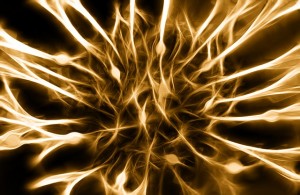GABA Benefits: Brain Neurotransmitter | Natural Tranquilizer | Sleep Enhancer
What is GABA?
GABA (gamma-aminobutyric acid) is a key nervous system neurotransmitter that is most concentrated in the brain.

Its brain chemical activities calm neuron activities, which in turn promotes feelings of relaxation, sedation and tranquility as well as healthier sleep patterns and deeper, more restful REM sleep.
Bio-Activities:
- “Settles” brain cells. GABA has an inhibitory effect on the activity of certain brain cells; this biological activity translates into feelings of relaxation and sedation. (1)
- Calms parasympathetic nervous system (PNS). Part of the autonomic nervous system that governs involuntary reactions of the body, the PNS modulates body activities that are tied to relaxation. Research has shown GABA appears to have significant effects on the PNS, reflected by physical changes associated with sedation including dilated pupils, relaxed blood vessels and a slower heartbeat. (2)
- Neuroprotective activity. Some animal research has suggested that gamma-aminobutyric acidmay defend brain cells against toxins; specifically, it appears to inhibit the release of a brain compound called glutamate that is considered harmful and toxic to neurons. (3) Because of this role, it has been noted in some research that potential GABA benefits may be useful for those suffering from neurodegenerative problems like vascular dementia.
What is GABA good for?
GABA benefits for brain neurotransmitter status may help those with emotional tension, stress and anxiety. It is popularly used for helping with insomnia and encouraging deep, restful sleep.
GABA has been researched in the quest to find natural supplements for ADD (attention deficit disorder); in this arena it has shown some promise, but research is largely theoretical and early at this stage.
It is also sometimes recommended among natural supplements for ADHD (attention deficit hyperactivity disorder), presumably for its potential ability to settle and soothe overactive brain cells.
GABA Benefits
People suffering from mood swings and depression have been shown in some research to have low blood gamma-aminobutyric acid levels. Because of this link, GABA has been suggested as a nutritional supplement that may help to balance and stabilize emotional wellness.
GABA benefits are most famously associated with its notable anxiolytic (anxiety-easing); its natural presence in the brain has known relaxation effect. In supplement form, it is not yet definitively known to mirror the effects of gamma-aminobutyric acid that is synthesized within the body; regardless, it has become a popular nutrient featured in brain supplements for a variety of mood and emotional health-supportive purposes.
GABA targets some of the exact same brain receptors as many of today’s leading anxiety drugs, tranquilizer, beta blockers and sedatives. It is important to note that, despite its technical sounding “gamma-aminobutyric acid” name, this compound is a natural nutritional supplement — not a pharmaceutical drug. However, its key benefit is that it may present a natural option for those seeking to optimize their brain chemistry without the side effects and addiction risks of some other synthetic tranquilizers.
Did you know? GABA is tied to the beneficial activities of other herbal brain supplements. Passion flower, one of the most highly regarded herbals for dissolving anxiety and encouraging tranquility, relaxation and rejuvenating sleep, is believed to be so effective because it elevates gamma-aminobutyric acid levels within the brain. Another herb with legendary relaxation properties, Valerian Root, is believed to work in a similar way: Interacting with GABA to soothe agitated brain cells and instill relaxation. (4, 5)
GABA Research: GABA-Infused Chocolate Busts Stress
One study administered a chocolate bar infused with gamma-aminobutyric acid 28 mg to healthy subjects to see how the neurotransmitter might influence psychological stress during math computation challenges. Researchers tested subjects’ heart rate and salivary changes in order to assess their mental duress during the math tests.
- At the study’s conclusion, researchers reported that subjects who took the GABA chocolate appeared to make a “quick recovery” from being stressed back to a normal state of mind. Researchers concluded that GABA chocolate had a “psychological stress-reducing effect.” (6)
GABA Found in Functional Foods
GABA Supplement Use
GABA supplement products are typically single-ingredient products, but may be included with other nutrients such as B-vitamins or L-theanine. They are often presented in capsule form, but may be found in scoopable powder that can be added to beverages. Gamma-aminobutyric acid supplements are sometimes formulated as sublinguals: Flavored lozenges that are placed underneath the tongue for quick-dissolve absorption and optimal bioavailability.
GABA Dosage
GABA dosage has been suggested at up to 500 mg per serving, three times a day including at bedtime for those seeking help with insomnia, anxiety, stress and mood imbalance. It is important to follow manufacturers’ directions for this supplement, as taking too much can have an opposite outcome, with side effects of anxiety and insomnia sometimes recorded in excessive dosages.
1. http://www.ncbi.nlm.nih.gov/pubmed/11679026
2. http://www.ncbi.nlm.nih.gov/pubmed/19462324?dopt=Abstract
3. http://www.ncbi.nlm.nih.gov/pubmed/17531382?dopt=Abstract
4. http://www.ncbi.nlm.nih.gov/pubmed/20042323
5. http://www.umm.edu/altmed/articles/passionflower-000267.html
6. http://www.ncbi.nlm.nih.gov/pubmed/19462324?dopt=Abstract